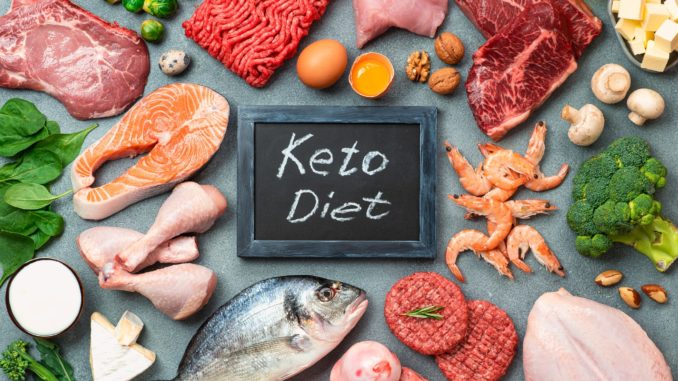
Table of Contents
What is Ketogenic Diet?
- Ketogenic diet is a diet which provides more calories from protein and fat and less calories from carbohydrates
- Ketogenic diet is a high fat, adequate protein and low carbohydrate dietary therapy that is primarily used in medicine to treat epilepsy in children.
- Ketogenic diet is also known as Paleo, South beach, Atkins diet, low carb high fat (LCHF), low carb diet and so on.
- ‘Ketogenic’ is the term used for ‘low carb diet’.
- Ketogenic diet is commonly called as ‘Keto diet’.
Role of Ketogenic Diet
- The ketones are created in the liver and used as energy on a keto diet.
- When you eat a lot of carbohydrates, your body will generate insulin or glucose.
- Because glucose is one of your body’s molecules that can be transformed and used as energy, it is chosen over other energy sources.
- Carbohydrate intake is typically restricted in a ketogenic diet meal plan.
- The body is put into a condition of ketosis.
- When food intake is substantially reduced, the body enters ketosis, which is a natural process that allows it to survive.
- Our bodies manufacture ketones in this state, which are released when the lipids in the liver are broken down.
- Ketosis is accomplished by consuming fewer carbohydrates rather than fewer calories.
- Maintaining a keto diet has the goal of forcing your body into this metabolic state.
- Although ketogenic diet is primarily promoted/advertised for weight loss, we must know that it is a medical diet that comes with serious risks.
Types of Ketogenic Diet
1. Standard ketogenic diet (SKD)
- This is a low-carbohydrate, moderate-protein, high-fat diet.
- It normally comprises 70% fat, 20% protein, and barely 10% carbohydrates
2. Cyclical ketogenic diet (CKD)
- This diet entails periods of increased carb refeeding, such as five ketogenic days followed by two high carb days.
3. Targeted ketogenic diet (TKD)
- This diet permits you to eat carbs in between workouts.
4. High protein ketogenic diet
- This ketogenic diet is comparable to a conventional ketogenic diet, however it contains extra protein. Typically, the fat-to-protein-to-carbohydrate ratio is 60% fat, 35% protein, and 5% carbohydrates.
How Does Keto Diet Work?
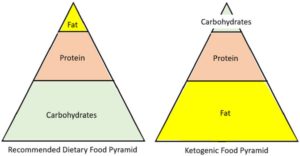
Source: https://www.mdpi.com/nutrients/nutrients-13-01654/article_deploy/html/images/nutrients-13-01654-g002.png
- On a keto diet, you limit your carbohydrate and protein intake, resulting in a high-fat diet.
- You don’t have enough glucose for fuel if you don’t eat enough carbohydrates or protein.
- Your body converts the body fat and the fat you eat into ketones as a backup fuel source.
- For example: When you eat less than 50 grams of carbohydrates each day, your body soon runs out of fuel (blood sugar). This usually takes three to four days.
- Then you’ll begin to break down protein and fat for energy, potentially resulting in weight loss. Ketosis is the term for this state.
- It’s vital to remember that the Ketogenic diet is a short-term diet designed to help you lose weight rather than improve your health.
Advantages of Ketogenic Diet
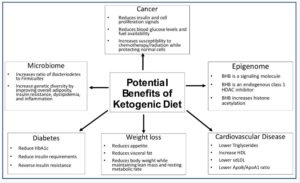
- Low-carbohydrate diets suppress your appetite and helps to loose weight
- At first, low-carb diets result in more weight loss, with a greater proportion of fat loss coming from the abdominal cavity.
- Triglycerides are fat molecules that circulate in your system and are known to drop dramatically when you follow this diet.
- Increased intensity of HDL- High Density Lipoprotein (‘Good’ Cholesterol)
- Reduced Blood Sugar and Insulin Levels and may lower the blood pressure
- Ketogenic diet reduces visceral fat.
- Reduces insulin requirement and helps in taking care of diabetes.
- Keto diet helps to prevent from different types of cancer.
- Metabolic syndrome is a condition linked to an increased risk of diabetes and heart disease, and this diet can help you avoid it.
- Ketogenic diet is used as a medicine for variety of medical illnesses
- It reduces blood glucose levels and fuel availability.
- Aside from insulin, keto diets assists to manage other hormones such as hunger hormone; ghrelin
Role of Keto Diet in Different Health Conditions
Ketogenic diets can help people with diabetes and pre-diabetes.
- For those with type 2 diabetes or prediabetes, the ketogenic diet can improve insulin sensitivity and stimulate fat loss, resulting in considerable health advantages.
Heart disease
- Body fat, HDL (good) cholesterol levels, blood pressure, and blood sugar levels can all benefit from a ketogenic diet.
Cancer
- As the keto diet may help reduce tumor growth, the diet is currently being researched as an additional cancer treatment.
Alzheimer’s disease
- The keto diet may assist to alleviate Alzheimer’s symptoms and slow the disease’s progression.
Epilepsy
- The ketogenic diet has been found in studies to reduce seizures in children with epilepsy
Parkinson’s disease
- Although additional research is needed, one study found that eating a plant-based diet can aid with Parkinson’s disease symptoms.
Polycystic ovarian syndrome (PCOS)
- The ketogenic diet can aid in the reduction of insulin levels, which may be important in polycystic ovarian syndrome.
Brain injuries
- According to certain studies, eating a healthy diet can help people recover from traumatic brain injuries.
Limitations of Keto Diet
Keto flu
- The term “keto flu” was coined because your body’s reaction to going into ketosis frequently resembles a flu-like symptom which is the effect of carbohydrate withdrawal.
- Switching to a fat-burning method confuses your body because it normally burns carbs (glucose) for energy.
Lots of saturated fat
- The ketogenic diet is connected to a rise in “bad” LDL cholesterol, which is linked to heart disease.
Deficiency of nutrients
- If a person does not consume a diverse range of vegetables, fruits, and grains, he/she could be deficient in micronutrients like selenium, magnesium, phosphorus, and vitamin B and C.
Problems with the liver
- Because there is so much fat to digest, the diet may aggravate any existing liver problems.
Problems with the kidneys
- The kidneys assist in protein metabolism, and the keto diet may cause them to become overworked.
Constipation
- Fibrous foods, such as grains and legumes, are limited on the keto diet.
Mood swings and hazy thinking
- To function, the brain requires sugar from healthy carbohydrates.
- Low-carb diets can cause irritation and disorientation.
Best Foods For Keto Diet
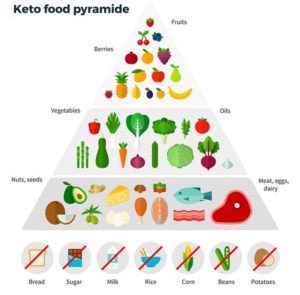
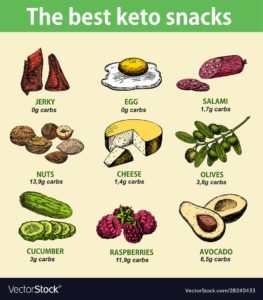
Foods to Avoid During Keto Diet
- Any foods with added sugar
- All grains even whole meal
- Factory farmed pork or fish
- Processed foods
- Artificial sweeteners
- Refined fats or oils
- Low fat, low card and zero carb processed products
- Milk
- Alcoholic sweet drinks
- Tropical fruits like pineapple, mango, and banana
- And for health reason avoid soy products
Can Anyone Start Keto Diet?
Ketogenic diet is not for everyone. Following individuals should never start keto diet as it may pose some health risks to them.
- Individuals with insulin-dependent diabetes
- Those with eating disorders
- Those with pancreatitis or kidney illness
- Women who are pregnant or breastfeeding
- Individuals who take sodium-glucose co-transporter 2 (SGLT2) inhibitors, a class of medication for type 2 diabetes.
Things to Ensure Before Starting A Keto Diet
- Understand the Ketogenic Diet’s recommended and prohibited Foods.
- Keto Involves a Lot of Fat, So, know your body response and think about your relationship with it!
- This is a moderate-protein diet, so change the way you think about protein.
- Sharpen your cooking skills to prepare fresh foods, as high-carb processed foods aren’t allowed on Keto diet
- Be aware of potential side effects, such as the “Keto Flu.”
- Boost your electrolytes to avoid or minimize keto side effects
- Recognize when the keto diet might not be a good fit for you and have a backup plan because it’s not intended to be a long-term weight loss strategy.
References and For More Information
https://www.ncbi.nlm.nih.gov/pmc/articles/PMC8153354/
https://www.diabetes.co.uk/keto/keto-diet-benefits.html
https://www.healthline.com/nutrition/ketogenic-diet-101#other-benefits
https://pubmed.ncbi.nlm.nih.gov/24721741/
https://www.webmd.com/diet/ss/slideshow-ketogenic-diet
https://www.health.harvard.edu/staying-healthy/should-you-try-the-keto-diet
https://www.researchgate.net/figure/Advantages-and-limitations-of-ketogenic-diet_tbl1_329202499
https://www.ncbi.nlm.nih.gov/books/NBK499830/
https://www.dietdoctor.com/low-carb/keto